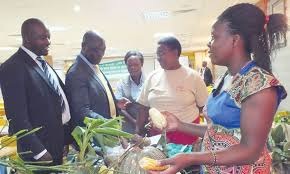Ugandan farmers advised on seeds
Posted on : Monday , 24th August 2015

KAMPALA, Uganda - Scientist’s at the National Agricultural Research Organization (NARO) have suggested small scale farmers form cooperatives.
“When small holder farmers form cooperatives, NARO can support them with technical skills to enable them establish community seed banks. When this is done we shall solve the problem of counterfeit seeds on the market and poor market distribution. Farmers have been alleging that they are being supplied with fake seeds by the private sector,” Mulumba Waswa of the Plant Genetic Resources Centre said last week.
The experts say that although the research agency has tried to develop wide varieties of improved seeds at their various crops research institutes countrywide many farmers in the country have failed to access such seeds as the private sector dominates the massive re-production of the breed varieties.
PGRC is a government agency under NARO responsible for conservation of seeds in the country, According to insiders, the centre has about 3,000 conserved seed varieties of different crops grown in the country.
Mulumba was speaking during a public dialogue on seed varieties organized by the Eastern and Southern Small Scale Farmers Forum (ESAFF) in Kampala.
He said farmer participation in seeds production will not only help them to get access to quality indigenous seed varieties, but also the boost community seed banks.
In Uganda the seed industry was under Government control since its inception in the late 1960s until its divestiture in 1999. Currently, the sector is private sector driven but is regulated by Government. Under the current arrangement, Government agencies such as NARO work in hand with the seed companies to multiply the breed varieties which later seeds companies sales to farmers the multiplied seed s on the local market.
Currently Uganda is having two seed system operating; these are formals sector (controlled by the seed companies) and the Informal’s sector (which are dominated by local farmers). Of the two systems formal sector contribute about 25% of the seed supply and the informal sector takes the lion share of about 75% market supply of seeds on the market.
But Solar Robert Lakidi from the department of crop protection in the Ministry of Agriculture Animal Industry and Fisheries told the East African Business Week that such market share is a disadvantage to the crop sector, because seeds supplied under the informal sector on many occasions do not meet the standard since the current seeds regulation empowers them (technical people at the Ministry) only to inspects seeds under the formals sector.
“The informal seed sector is not regulated, seed source is not known and standards are not adhered to that is why technical people at the Ministry we want the legislators to pass the National seed policy draft, 2013 which aims at transforming the informal seed sector into a viable commercial sector here the ministry will have the capacity to regulate the players” he said.
He explained that if the policy is passed this will enable the government to put in place mechanisms to control the quality of seeds in the informal seed sector, and also build capacity in terms of training of personnel in the informal seed sector.
Although government officials are blaming the informal sector, some farmers who attended the dialogue said the formal sector has also supplied farmers with counterfeit seeds especially to those benefiting from Operation Wealth Creation. Other companies have exploited farmers by selling to them expensive seeds on the local market.
Giving testimony during the dialogue Arumadi Bakole Joel farmer from Arua west Nile said he was allocated two Kilograms of maize seeds by a seed company under the operation Wealth creation which is headed by General Salim saleh but, to his surprise, only two seeds germinated yet the seeds were supplied by a local seed company registered in Uganda.
Because of the increased cases of counterfeit agricultural inputs. Mario Mungu Acel, the National Chairman ESAFF Uganda urged the Ministry of Agriculture to use its mandate to deregister all seed companies that have and continue to supply local farmers with counterfeit agricultural related inputs, he said the vice slows the growth of the sector which is highly dominated by small scale farmers.
During the same dialogue, the state Minister of Agriculture, Vincent Ssempijja, told farmers the Ministry is in the final stages of the National seed policy Draft adoption by Cabinet and later presented before the agriculture committee of parliament for further discussion before being tabled on the floor of Parliament.
He said if the policy is in place ir will help the agricultural ministry to implement some of the stringent regulations that govern the seed sectors in the country.
However, he also asked small holder famers to form cooperatives. He said this would help them to access lucrative market both locally and internationally.


